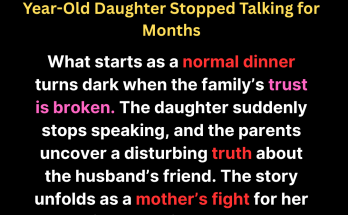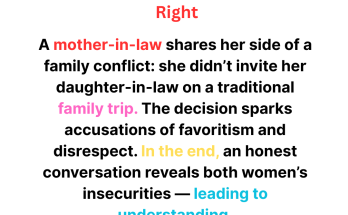What happens when a simple pool prank clashes with deeply held parenting principles? One woman faced this exact dilemma at a family gathering, sparking a heated standoff that left everyone questioning boundaries.
She insists on teaching her children that “no means no” applies everywhere, no exceptions. Her in-laws dismiss her as overly strict, and even her husband struggles to support her stance. The incident escalated quickly, forcing her to choose between staying silent or taking a stand that disrupted the holiday for her kids.

‘AITAH for humiliating my husband by leaving his family party, because I will always teach my kids that no means no?’
The background sets a firm foundation for the family’s ongoing tensions.


The specific event unfolded during a holiday celebration.


Reactions at the party highlighted the divide, leading to an immediate confrontation.


The core conflict revolves around enforcing personal boundaries on others during a lighthearted moment. The wife views the dunking as a consent violation that undermines her parenting message, while the family sees it as harmless play between adults. This escalated because prior warnings went unheeded, clashing values on respect and fun, and affecting the husband and children indirectly.
The wife’s actions stem from fear that inconsistent modeling will confuse her kids about consent. She expects alignment from extended family. The husband feels embarrassed and controlled, prioritizing family harmony. The fiancée showed no distress, indicating mutual play. Communication broke down as the wife acted unilaterally, lacking mutual discussion.
Relationship expert Dr. Sue Johnson explained that “successful couples repair conflicts by tuning into each other’s vulnerabilities rather than defending positions” (Hold Me Tight, 2008). This applies directly—emotions dominated over understanding the prank’s context, eroding trust and turning a minor event into a relational rift.
To resolve, schedule a calm private talk focusing on feelings, like “I felt disrespected when my boundary was ignored.” Set clear family rules in advance for gatherings. Practice pausing during triggers to ask, “Is this about my kids or my principles?” Weekly check-ins can rebuild empathy through shared vulnerabilities.
Check out how the community responded:
Social media users weighed in heavily on this family drama, splitting into clear camps with strong opinions on overreactions and personal boundaries. The thread buzzed with judgments, advice, and some sharp humor, revealing how divisive parenting styles can get online.
Many commenters criticized the original poster for inserting herself into unrelated adult interactions. They saw the response as excessive and damaging to the family vibe.
![[Reddit User] − Wait, what? You're upset about something that someone else did to their other half, and you left. ...because they shouldn't do that in front of you?](https://en.aubtu.biz/wp-content/uploads/2025/11/wp-editor-1761968047918-1.webp)




![[Reddit User] − I genuinely don’t understand…](https://en.aubtu.biz/wp-content/uploads/2025/11/wp-editor-1761968058041-6.webp)


Others piled on, labeling the behavior as judgmental and predictive of bigger problems. These voices emphasized minding one’s own business in relationships.







A few added sarcasm or pointed observations to lighten or sharpen the critique. Their remarks focused on irony and expectations.






This incident shows how rigidly applying personal rules to others can backfire, isolating you from family while confusing the lesson for kids. Consent matters, yet context and relationships define its boundaries. Flexibility prevents turning principles into weapons that harm connections.


